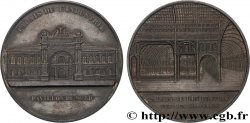Лицевая сторона
Аверс: легенда: QUI NE RENAIT PAR L’EAU ET LE SAINT-ESPRIT N’ENTRE PAS DANS LE ROYAUME DE DIEU (ST IEAN III, 5.) // BAPTEME 23 8.BRE 1850 // PENSIONNAT / DES FRERES A PASSY.
Аверс: описание: La femme à gauche, drapée à l’antique, tient un enfant nu. Baptistère au centre de la médaille où deux putti tendent des flacons vers la colombe du Saint Esprit radiée. Scène de baptême du Christ sur une des faces du baptistère. Livre ouvert au pied timbré : EVANGILE. Un ange à droite tient un lis. Signé : DESAIDE ROQUELAY.
Обратная сторона
Реверс: легенда: C’EST LE PAIN QUI EST DESCENDU DU CIEL (S.T IEAN VI.50) - PREM. COMMUNION 29 MAI 1864 + CONFIRMATION 29 MAI 1864 // EUGENE MOREL.
Реверс: Описание: Le Christ, au centre, tient le calice dans ses mains. Deux anges, de part et d’autre du Christ, veillent sur les deux pénitents agenouillés. A l’exergue, un cartouche gravé au nom du récipiendaire. Signé : DESAIDE ROQUELAY.
Комментарий
Историческая справка
SECOND EMPIRE
(02/12/1852-04/09/1870)
Proclaimed Emperor under the name of Napoleon III, Louis Napoleon made his solemn entry into Paris on December 2, 1852.. He married Eugénie Marie de Montijo, a Spanish aristocrat, in January 1853. His reign can be divided into three periods: the authoritarian Empire until 1860; the Liberal Empire from 1860 to 1870 then the Parliamentary Empire in 1870. During the authoritarian Empire, Napoleon III exercised his power without sharing, controlled the press while the newspapers practiced self-censorship to avoid their suppression.. The prefects exercise unlimited power in the departments, the mayors, the civil servants are appointed by the government. As under the First Empire, Education and the University are monitored. Maintaining the main principles of the revolution, the sovereignty of the people is continued thanks to the consultation by plebiscite. On the economic level, the boom is important, industrialization develops as well as credit organizations and department stores. Military prestige is increased by the Crimean War which allows France to play an international role. The attack of Orsini (January 1858) does not prevent France from intervening in Italy to make triumph the principle of nationalities and allows the attachment of Nice and Savoy by the treaty of Turin (March 1860). From 1860, the Empire moved towards more freedoms: free trade treaty with England, appearance of a weak opposition in the Legislative Body, granting of the right to strike (1864), liberalization of the press (1868). On the international level, France acquires New Caledonia, Cochinchina and encourages the digging of the Suez Canal by Ferdinand de Lesseps. In Mexico, however, support for Maximilian and Austria was a failure. The 1869 elections were very bad for the regime and the opposition obtained 45% of the votes. The regime then evolved towards a parliamentary Empire by calling Émile Ollivier, leader of the Orléanist and liberal party, to power. After Sadowa in 1866 when Prussia crushed Austria, the affair of the throne of Spain and the dispatch from Ems led to the war which was declared on July 19, 1870. Accumulating setbacks, the French army was surrounded in Metz then Napoleon III, ill, capitulated at Sedan on September 2. As soon as the news was known, the decline of the Empire was announced by Gambetta, then the Republic was proclaimed on September 4.. Napoleon III was then taken captive to Hesse and then left for Kent where he died in 1873..










 Cообщить об ошибке
Cообщить об ошибке Распечатать страницу
Распечатать страницу Отправить мой выбор
Отправить мой выбор Задать вопрос
Задать вопрос Consign / sell
Consign / sell
 Информация
Информация









